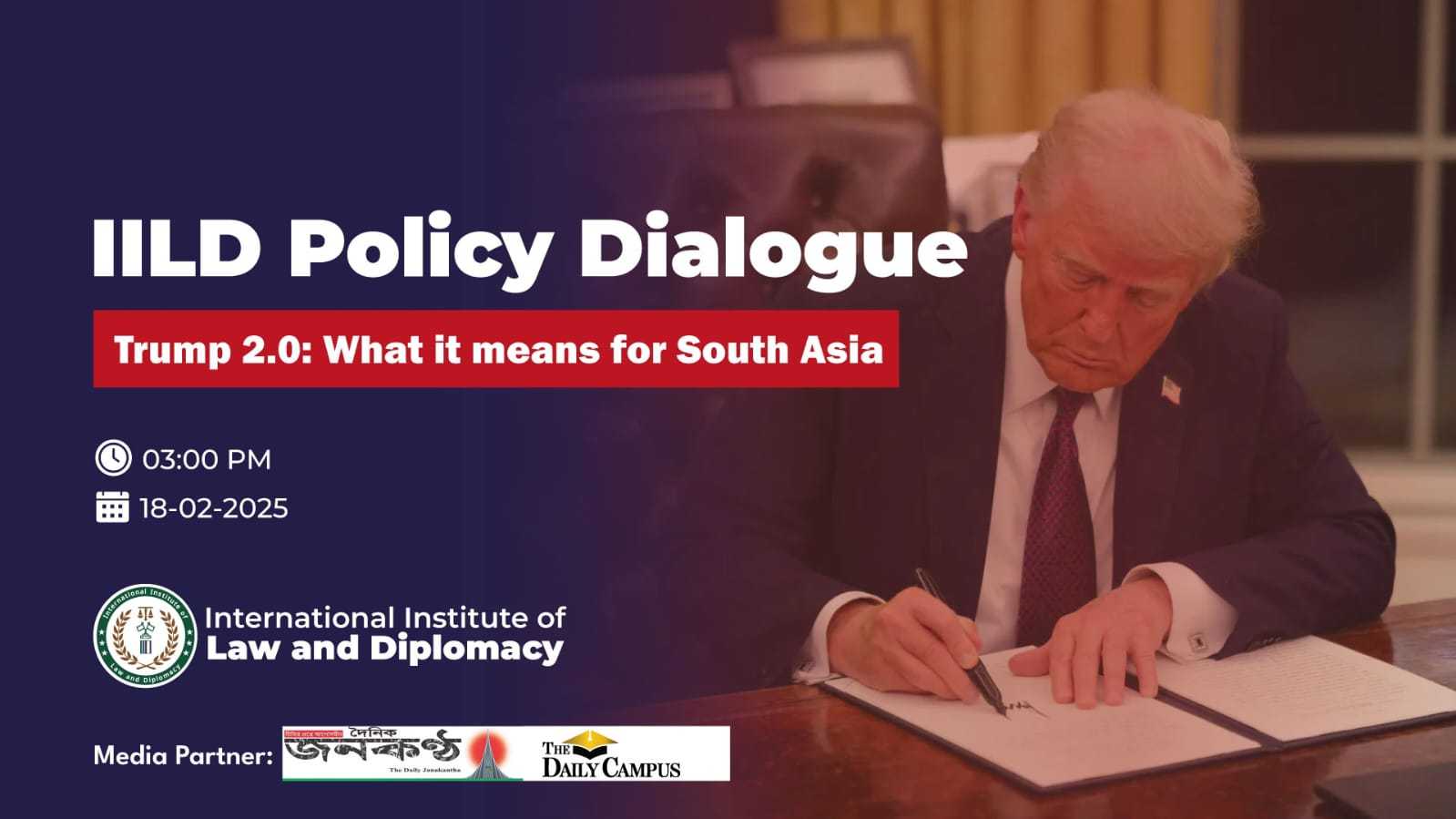
President Donald Trump’s second term in the White House will shape South Asia, including Bangladesh across multiple domains. President Trump’s pragmatic and transactional foreign policy will restructure the diplomatic stances of South Asian countries. Given Bangladesh’s geographical location in the Indo-Pacific region, with its recent mass uprising led interim government will face its own share of challenges and opportunities in the Trump 2.0 era. On the economic side, protectionist trade policies could pose a threat to the export-led economy of Bangladesh, particularly the ready-made garment (RMG) sector. Strategically, likelihood of the U.S. looking Dhaka through the lens of Delhi could make Bangladesh uncomfortable. Also, changes in the U.S. policies regarding climate could impact Bangladesh's climate agenda. Nevertheless, if Bangladesh can earn the confidence of the new administration, it may open new windows of opportunities as well. Bangladesh can attract the industries which would look for a new country to relocate from China. Evaluating these potential shifts is essential to understand the likely direction of the US-Bangladesh relationship and other neighboring countries in South Asia. To this end, this keynote is divided into four thematic categories covering geopolitics, security and defense, economy and climate change. The paper ends with recommendations for Bangladesh.
Geopolitics:
1. Indo-Pacific Strategy
and QUAD: Strengthening U.S.-India Ties
Indo-Pacific strategy is
a key component of Trump’s foreign policy, indicating a neo-continental
confrontation with the People's Republic of
China (PRC). This strategy is expected to foster a far more profound
engagement with India, a key partner of the US, for the ‘Free and Open Indo-Pacific’.
The Quadrilateral Security Dialogue (QUAD), which includes the United States, India, Japan, and Australia, will remain the focal point of the strategy to advance stability and eliminate threats at sea. Under Trump, the QUAD is likely to enhance the frequency of joint military drills and technological cooperation to check Chinese aggression.
2. AUKUS: Expanding
Military Presence
The AUKUS pact between
the U.S., the UK, and Australia will help deepen U.S. military involvement in
the Indo-Pacific. This is meant to threaten China into not dominating important
maritime transit channels. But it could also have the flip side of inviting
criticism from countries in the SAARC nations apprehensive at steps towards ‘militarization’
As for the QUAD member
India, AUKUS might bring extra security assurances, however, other South Asian
countries like Bangladesh and Sri Lanka might still be wary because of their
business with China.
3. Countering China:
A Hardline Approach
The second administration
of President Trump could adopt an even harsher stance on China. Backing Taiwan
and the hike in military assistance for them might trigger a provocation in the
Indo-Pacific region. Proposing alternative infrastructure projects to counter Belt,
Road Initiative (BRI). These harsh policies will shape South Asian politics
mainly, through pressure on regional governments to stay away from China. For
instance, a continued partnership between Pakistan and China could result in a
breakdown of Pakistan’s partnership with Washington.
4. India’s Strategic
Role
Once again, India is
indeed predicted to become a partner for the U.S. under Trump due to mutual
apprehensions regarding China. Prime Minister Narendra Modi’s latest visit to
the U.S. and the subsequent joint statement indicated such a direction. QUAD
and India's increased strategic partnership with the United States will help
India to become stronger in the South Asian region but India’s strategic
relation with Russia may face backlashes. Nevertheless, Trumps as transactional
leader expressed unhappiness on tariff and non-tariff barriers on U.S. trade in
the Indian market. Moreover, deportation of illegal Indian immigrants and unfair
trade practices by India might become the focal points in the day ahead.
Bangladesh’s Implication:
- Transactional Diplomacy and Reduced Soft Power:
- Trump's "America First" approach focuses
more on transactional diplomacy than democracy and human rights
promotion. Simultaneously, Trmup’s crusade on USAID risks U.S. soft power
influence in Bangladesh.
- A decreased focus on nation-building efforts by the U.S. could impact support for democratic institutions and slow down reform agendas of the interim government.
- India’s Increased Role:
- With U.S. attention diverted, India might try to
reassert its influence over Bangladesh. This could embolden pro-Indian
factions within Bangladesh's political landscape.
- The India-U.S. partnership in the Indo-Pacific
could pressure Bangladesh to align its policies more closely with
New Delhi, complicating its efforts to maintain neutral foreign policy
stances. However, it will mostly depend on the chemistry between
President Trump and President Xi Jinping. If President Trump choose to
avoid the trade war with China then Bangladesh shall get a favorable
geopolitical landscape to navigate its foreign relations.
- Concerns over Minority Rights:
- Trump's administration may raise concerns about minority
rights and religious extremism in Bangladesh, viewing the country
through an India-centric lens. This could lead to diplomatic
tensions and external scrutiny of Bangladesh’s internal
policies.
Security and
Defense:
1. India can Play a
Sizeable Part in the U.S. Defense Plan
Trump's second term is
expected to further strengthen the Indo-US defense partnership. The United
States is willing to become the major supplier of armaments for the Indian
defense system.
Key Impacts:
·
Promoting arms exports to India as well as
the supply of hi-tech equipment and weapons systems.
·
Coordinated Operations to boost naval security
in the Indo-Pacific region.
·
Possible joining of efforts in missile
defense affairs and exchange of information.
·
Controlling terrorism and focusing on
groups that work from Pakistan.
2. Pakistan’s Challenges
The speculation of
another Trump presidency could mean huge defense problems for Pakistan as the
partnership between the U.S. and India is predicted to grow stronger in the
subsequent years. Pakistan may have its military assistance diminished and face
diplomatic pressure for counterterrorism.
Key Impacts:
·
Reduction in defense funding:
Trump’s first term also experienced most of the relations with Pakistan put on
hold and military aid cut off. It could go on like this, worsening the
relations between the US and Pakistan on the defense front.
·
Increased diplomatic isolation: The
Trump administration is likely to pressure on Pakistan for operations against
terrorist organizations, specifically those threatening India.
·
Possible sync of American policy with
India’s security perception may undermine Pakistan’s defense priorities.
3. China’s Role and
American Reaction
The presidency of Donald
Trump has predicted a high tone to China and this will influence South Asia‘s
security defense programs. The U.S. will most assuredly seek to apply pressure
on its allies in South Asia to join in efforts to challenge and contain China
militarily and economically, mainly through defense agreements and strategic
partnerships.
Key Impacts:
·
The U.S. could build more military bases
in the area to checkmate China’s growing naval influence.
·
It will force the South Asian countries in
general to side with the US in its strategic rivalry with China.
· It may not be well seen Back in America, especially in the Trump administration, that Pakistan and China have good relations.
Bangladesh’s
Implications
Opportunities:
1. Establishment of
Strategic Partnership with the U.S in Defense Cooperation
Bangladesh has been a
preferred beneficiary of Foreign Military Financing (FMF) and International
Military Education and Training (IMET). The U.S. has also facilitated military
equipment transfers, including:
·
Hamilton-class cutters for the Navy.
·
Mine Resistant Ambush Protected (MRAP)
vehicles for peacekeeping operations
·
Annual training programs and combined
exercises including the Combined Agile Response to Assist in Disasters (CARAT)
as well as the Pacific Angel.
As of late, the U.S. has
been very keen on signing official agreements with its partners such as GSOMIA
(General Security of Military Information Agreement) and ACSA
(Acquisition and Cross-Servicing Agreement). These agreements could pave
the way for:
· Efficient
intelligence-sharing
· Joint
military operations
· Advanced arms sales
2. Partners in the
Indo-Pacific
Bangladesh has a crucial
geographic location in the Bay of Bengal that places this country amidst the
greatest importance in Indio-Pacific politics. The country hosts key seaports
with easy access to the open sea which transships approximately one-third of
the world's seaborne cargo and half of the world’s container cargo. The United
States considers Bangladesh as a like-minded partner in preserving security at
sea and a rule-based Indo-Pacific. Under the Trump presidency the height of
this partnership might expand.
Challenges:
1. Balancing U.S.-China
Rivalry
Bangladesh has a strong defense cooperation with China which is the source of most of the types of equipment needed. The United States under Trump 2.0 is very likely to push Bangladesh to decrease its dependence on Chinese-sourced weapons and equipment and purchase U.S. origin weaponries which will be both expensive and incompatible with existing weapon platforms. However, Bangladesh can shift to new weapon systems provided that these systems are coming within an affordable price. Simultaneously managing relations with both the U.S. and China will necessarily be important for Bangladesh to sustain its strategic independence.
Economy
1.
Trade and Tariff Policies
A second Trump administration would
likely continue its protectionist trade policies, imposing higher
tariffs on imports and renegotiating trade agreements to favor U.S.
interests. This can have significant consequences for Bangladesh’s export-driven
economy, particularly the ready-made garment (RMG) sector, which
heavily depends on the U.S. market.
- A 5% tariff increase on Bangladeshi exports to
the U.S. could result in an annual loss of $412 million, impacting
the country’s $6.89 billion export revenue from the U.S..
- Bangladesh’s reliance on the RMG sector makes it
vulnerable to changes in U.S. trade policies, potentially reducing its global
competitiveness.
2. Shifting Supply Chains
If the U.S.-China trade war
continues it will drive the restructuring of global supply chains,
offering opportunities for South Asian countries like Bangladesh to
attract manufacturing investments as companies would seek alternatives
to China.
- Vietnam
has been a significant beneficiary of the trade war, attracting more FDI
than Bangladesh in Trump’s first term. For Bangladesh to remain
competitive, it must improve its infrastructure and logistics.
- Bangladesh could benefit from supply chain
diversification, but it needs to focus on upgrading its industrial
zones and streamlining regulations to attract more investment.
3. Economic Partnerships
Trump’s bilateral trade approach
may create opportunities for countries like India and Bangladesh
to secure tailored trade deals.
- The ICT sector, pharmaceuticals, and agro-processing
industries are emerging sectors where Bangladesh could seek FDI
from the U.S., diversifying its economy beyond RMG.
- However, Bangladesh's dependence on Chinese
investments, particularly in infrastructure projects, could
become a sticking point in U.S.-Bangladesh relations.
4. Remittances and Immigration
Policies
The Trump administration’s strict
immigration policies could affect remittance flows, which are
crucial for Bangladesh’s economy.
- In 2023, Bangladesh received $511.96 million in
remittances from the U.S., making up a significant portion of the
country’s foreign exchange earnings.
- Stricter visa policies and immigration reforms
could reduce remittance inflows, impacting household incomes and
consumption in Bangladesh.
5. Impact on Regional Cooperation
Trump’s America First approach
and withdrawal from multilateral agreements could weaken regional trade
bodies like SAARC and ASEAN, affecting South Asian economic
integration.
- India’s growing influence in the QUAD could further marginalize smaller South Asian economies like Bangladesh, pushing them to seek alternative partnerships.
Climate Change
1. South Asia's Climate
Vulnerabilities
South Asia is one of
the most climate-vulnerable regions in the world, facing:
- Rising sea levels
- Increasing frequency of floods,
cyclones, and droughts
- Air pollution and deforestation
Trump’s anti-climate
policies could worsen these risks by promoting fossil fuel production
and withdrawing from international climate commitments, such as the Paris
Agreement.
Key Concerns for South
Asia:
- Increased Carbon Emissions:
Trump's policies are projected to increase U.S. carbon emissions by 4
billion tons by 2030, worsening global climate change.
- Reduced Climate Aid: The U.S. would likely reduce financial aid to developing countries for climate adaptation and disaster response.
2. Specific Impacts on
Bangladesh
Bangladesh is one of
the most climate-vulnerable countries in the world, with frequent natural
disasters like floods, cyclones, and rising sea levels. Under a second Trump
administration, Bangladesh would face increased challenges in securing climate
financing and international cooperation.
Key Impacts on
Bangladesh:
- Reduced U.S. Support for Climate
Initiatives
- The Trump administration would
likely cut funding for international climate programs, reducing
the financial support available to Bangladesh for disaster mitigation,
adaptation, and renewable energy projects.
- Bangladesh heavily relies on global
climate funds to achieve 40% renewable energy by 2041.
- Fossil Fuel Reliance
- Trump's policies favor oil and
gas production, potentially encouraging South Asian countries,
including Bangladesh, to delay their transition to renewable energy.
- This could lead to higher carbon
emissions and environmental degradation in the region.
- Impact on Renewable Energy Projects
- The U.S. under Trump could withdraw
clean energy investments, making it harder for Bangladesh to develop solar,
wind, and other renewable projects.
- The repeal of the Inflation
Reduction Act could slow down global progress in clean energy
technologies, affecting Bangladesh's ability to source affordable
clean energy solutions.
Recommendations
for Bangladesh:
To effectively navigate the challenges posed by a potential second Trump
presidency, Bangladesh could consider the following recommendations based on
insights from the provided documents:
1. Strengthen Economic Diversification
- Address Protectionist Policies: Trump’s administration has historically favored
protectionism and transactional diplomacy. Bangladesh should diversify its
export markets beyond the U.S. to mitigate risks, particularly in the
Ready-Made Garment (RMG) sector.
- Leverage Strategic Advantages: Focus on attracting U.S. investments in
infrastructure, renewable energy, and manufacturing to align with
potential U.S. interests.
2. Proactive Climate Diplomacy
- With Trump’s stance on climate change leaning toward
fossil fuel reliance and possible rollback of green policies, Bangladesh
must intensify global advocacy for climate action, emphasizing its
vulnerability to climate impacts.
- Strengthen collaborations with climate-conscious U.S.
states, private sectors, and global institutions.
3. Navigate Geopolitical Dynamics
- Indo-Pacific Strategy: Bangladesh's strategic location in the Indo-Pacific
makes it an essential player. The country should maintain a balanced
relationship with both the U.S. and China while reinforcing its
non-aligned stance in geopolitical conflicts.
- Defense Collaboration: Engage in defense dialogues focusing on maritime
security and counterterrorism to align with U.S. Indo-Pacific priorities.
4. Reinforce Domestic Stability
- Maintain Political Neutrality: The Trump administration might deprioritize democracy
and human rights in foreign policy. Bangladesh should internally focus on
democratic consolidation to ensure stability and international
credibility.
- Protect Minority Rights: Address U.S. concerns regarding minority rights to
avoid diplomatic friction and improve bilateral ties.
5. Enhance Diplomatic Engagement
- Build bipartisan relationships with U.S. policymakers,
think tanks and industry leaders to ensure Bangladesh's strategic
interests are represented regardless of the U.S. administration.
- Emphasize shared goals such as counterterrorism,
economic growth, and regional stability.
6. Adapt Trade Strategies
- Utilize Trump’s inclination for transactional diplomacy
by negotiating trade deals that favor mutual economic benefits.
- Capitalize on any shifts in global supply chains
arising from U.S.-China trade tensions to attract foreign direct
investment.
Keynote Author: Md. Ataur Rahman Talukder. This keynote was presented at the IILD Policy Dialogue on "Trump 2.0: What it Means for South Asia?"





Leave a reply